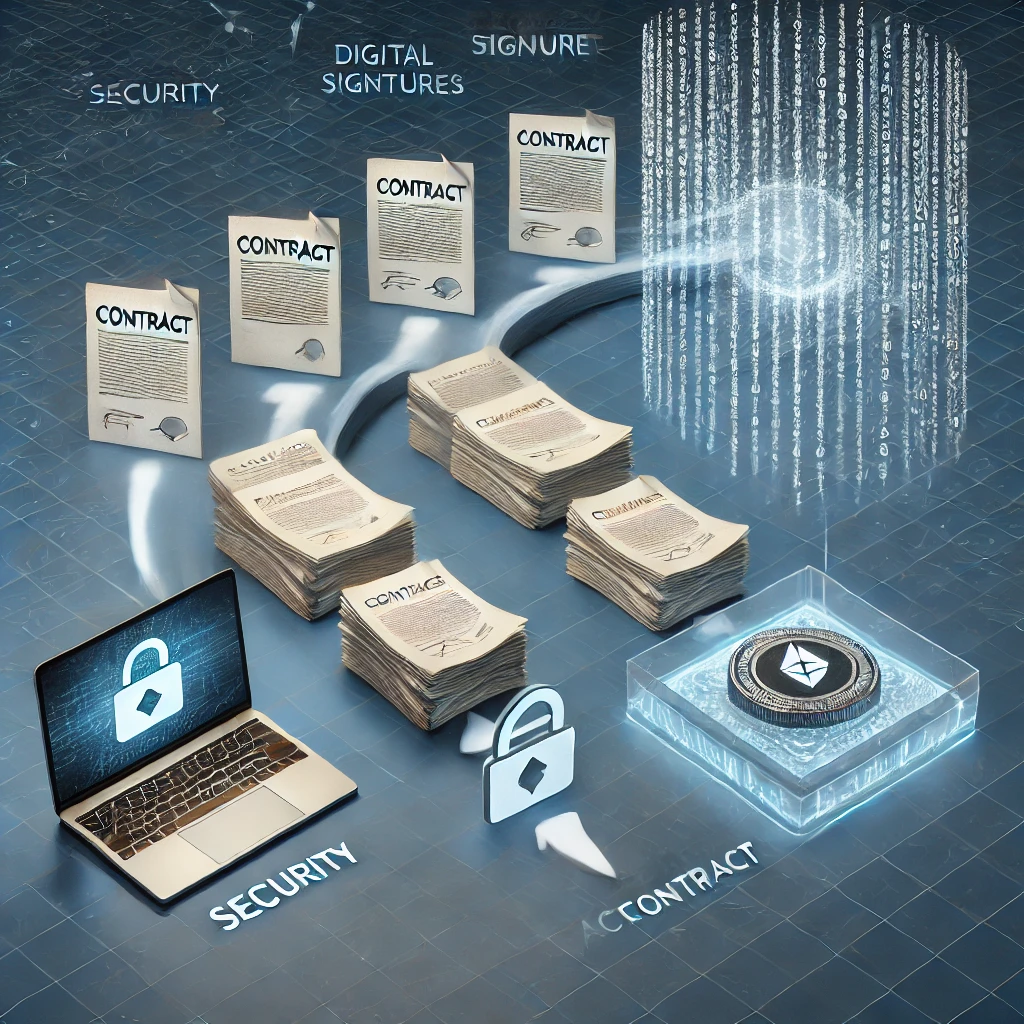Introduction
Contracts form the backbone of business transactions, ensuring accountability and enforcing agreements between parties. However, fraud and forgery have plagued traditional contract management for decades. From document tampering to identity fraud, businesses and individuals often fall victim to manipulated agreements.
With the rise of blockchain technology, a new era of contract security has emerged. Blockchain provides immutability, transparency, and decentralization, making it a powerful tool for preventing contract fraud and forgery. In this article, we explore how blockchain technology is transforming contract security and eliminating fraudulent activities.
The Problem: Contract Fraud & Forgery
Contract fraud occurs in various forms, including:
- Unauthorized Modifications: Signed contracts can be altered post-signing, creating disputes.
- Fake Signatures: Traditional contracts rely on signatures that can be easily forged.
- Identity Fraud: Parties may misrepresent themselves or manipulate contract terms.
- Document Tampering: Physical and digital documents can be edited without detection.
- Backdating & Misrepresentation: Critical dates or contract clauses can be altered for fraudulent gains.
These vulnerabilities lead to legal disputes, financial losses, and a lack of trust in business transactions.
How Blockchain Prevents Contract Fraud & Forgery
Blockchain technology offers unique features that address these issues by ensuring the authenticity and security of contracts.
1. Immutability: No Alterations or Tampering
Blockchain’s decentralized ledger is immutable, meaning once a contract is recorded, it cannot be altered or deleted. Every transaction is timestamped and cryptographically secured, preventing unauthorized modifications.
✅ Benefit: Ensures contracts remain in their original state, eliminating fraud and tampering.
2. Digital Signatures & Cryptographic Verification
Blockchain contracts utilize public-private key cryptography, allowing users to sign agreements digitally with a secure, verifiable signature. Unlike traditional signatures, blockchain-based signatures are unique and mathematically linked to the signer’s identity.
✅ Benefit: Eliminates forged signatures and ensures only authorized parties can sign.
3. Identity Verification with Decentralized IDs (DIDs)
Blockchain-based Decentralized Identity (DID) solutions provide a way to verify the identity of contracting parties. Instead of relying on central authorities, blockchain enables users to prove their identity securely without the risk of impersonation.
✅ Benefit: Reduces identity fraud by ensuring only verified parties enter into contracts.
4. Transparent & Auditable Contract History
Every action related to a blockchain contract—creation, signing, modification requests—is recorded in a public or private ledger. Any attempt to manipulate the contract will be instantly detected, as all previous versions are cryptographically linked.
✅ Benefit: Creates a full audit trail, ensuring accountability and preventing hidden modifications.
5. Smart Contracts: Automated Execution & Enforcement
Smart contracts are self-executing agreements with predefined rules written into code. They eliminate manual intervention and prevent manipulation by ensuring contracts execute only when agreed-upon conditions are met.
✅ Benefit: Reduces fraud by automating contract execution and removing third-party interference.
Real-World Use Cases of Blockchain in Contract Fraud Prevention
1. Legal Industry
Law firms and businesses use blockchain-based smart contracts to ensure legal agreements are immutable and executed as per predefined terms.
Example: SignChain, a blockchain-based contract management platform, enables secure, verifiable digital signing and tamper-proof document storage.
2. Real Estate Transactions
Property contracts stored on blockchain prevent title fraud and disputes over ownership.
Example: Propy is using blockchain to facilitate secure and fraud-resistant real estate transactions.
3. Supply Chain Agreements
Supply chain contracts on blockchain ensure vendor agreements, payments, and deliveries are executed transparently without tampering.
Example: IBM’s Food Trust Blockchain enhances food supply chain traceability, reducing fraud.
The Future of Secure Contracts with Blockchain
As blockchain adoption grows, contract fraud and forgery will drastically decline. Businesses, governments, and individuals will benefit from:
✔️ Tamper-proof agreements
✔️ Verifiable digital signatures
✔️ Automated execution via smart contracts
✔️ Real-time contract audits
✔️ Decentralized identity verification
In the coming years, blockchain-based contracts will become the gold standard for secure, transparent, and fraud-proof agreements.
Conclusion
Blockchain is revolutionizing contract security by eliminating fraud, forgery, and unauthorized modifications. Its immutability, transparency, cryptographic verification, and smart contract automation ensure that agreements remain secure and tamper-proof.
Businesses looking to safeguard contracts against fraud should adopt blockchain-powered contract management solutions like SignChain.
🔹 Want to experience fraud-proof digital signing & contract management? Try SignChain today! 🚀





